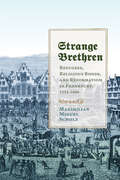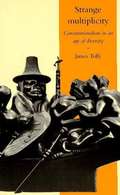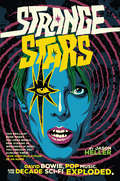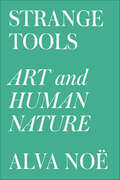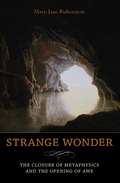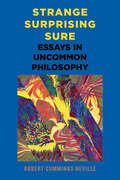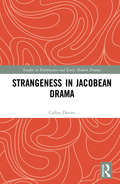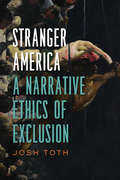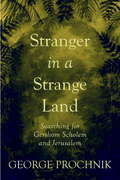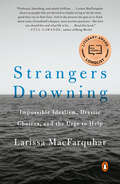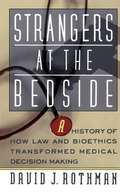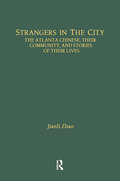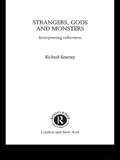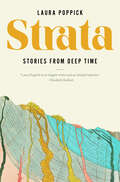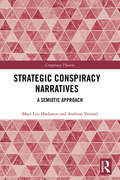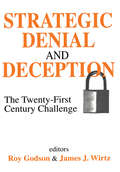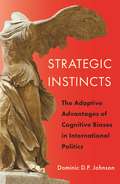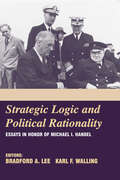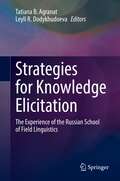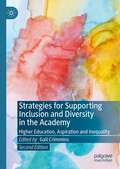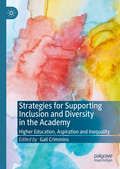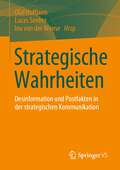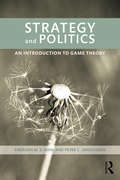- Table View
- List View
Strange Brethren: Refugees, Religious Bonds, and Reformation in Frankfurt, 1554–1608 (Studies in Early Modern German History)
by Maximilian Miguel ScholzIn the sixteenth century, German cities and territories welcomed thousands of refugees fleeing the religious persecution sparked by the Reformation. As Strange Brethren reveals, these Reformation refugees had a profound impact on the societies they entered. Exploring one major destination for refugees—the city of Frankfurt am Main—Maximilian Miguel Scholz finds that these forced migrants inspired new religious bonds, new religious animosities, and new religious institutions, playing a critical role in the course of the Reformation in Frankfurt and beyond. Strange Brethren traces the first half century of refugee life in Frankfurt, beginning in 1554 when the city granted twenty-four families of foreign Protestants housing, workspace, and their own church. Soon thousands more refugees arrived. While the city’s ruling oligarchs were happy to support these foreigners, the city’s clergy resented and feared the refugees. A religious fissure emerged, and Frankfurt’s Protestants divided into two competing camps—Lutheran natives and Reformed (Calvinist) foreigners. Both groups began to rethink and reinforce their religious institutions. The religious and civic impact was substantial and enduring. As Strange Brethren shows, many of the hallmarks of modern Protestantism—its confessional divides and its disciplinary structures—resulted from the encounter between refugees and their hosts.Studies in Early Modern German History
Strange Multiplicity: Constitutionalism In An Age Of Diversity
by James H. TullyIn the inaugural set of Seeley Lectures, the distinguished political philosopher James Tully addresses the demands for cultural recognition that constitute the major conflicts of today: supranational associations, nationalism and federalism, linguistic and ethnic minorities, feminism, multiculturalism and aboriginal self government. Neither modern nor post-modern constitutionalism can adjudicate such claims justly. However, by surveying 400 years of constitutional practice, with special attention to the American aboriginal peoples, Tully develops a new philosophy of constitutionalism based on dialogues of conciliation which, he argues, have the capacity to mediate contemporary conflicts and bring peace to the twenty-first century. Strange Multiplicity brings profound historical, critical and philosophical perspectives to our most pressing contemporary conflicts, and provides an authoritative guide to constitutional possibilities in a multicultural age.
Strange Stars: How Science Fiction and Fantasy Transformed Popular Music
by Jason HellerA Hugo Award-winning author and music journalist explores the weird and wild story of when rock ’n’ roll met the sci-fi world of the 1970sAs the 1960s drew to a close, and mankind trained its telescopes on other worlds, old conventions gave way to a new kind of hedonistic freedom that celebrated sex, drugs, and rock ’n’ roll. Derided as nerdy or dismissed as fluff, science fiction rarely gets credit for its catalyzing effect on this revolution.In Strange Stars, Jason Heller recasts sci-fi and pop music as parallel cultural forces that depended on one another to expand the horizons of books, music, and out-of-this-world imagery.In doing so, he presents a whole generation of revered musicians as the sci-fi-obsessed conjurers they really were: from Sun Ra lecturing on the black man in the cosmos, to Pink Floyd jamming live over the broadcast of the Apollo 11 moon landing; from a wave of Star Wars disco chart toppers and synthesiser-wielding post-punks, to Jimi Hendrix distilling the “purplish haze” he discovered in a pulp novel into psychedelic song. Of course, the whole scene was led by David Bowie, who hid in the balcony of a movie theater to watch 2001: A Space Odyssey, and came out a changed man…If today’s culture of Comic Con fanatics, superhero blockbusters, and classic sci-fi reboots has us thinking that the nerds have won at last, Strange Stars brings to life an era of unparalleled and unearthly creativity—in magazines, novels, films, records, and concerts—to point out that the nerds have been winning all along.
Strange Tools: Art and Human Nature
by Alva NoëA philosopher makes the case for thinking of works of art as tools for investigating ourselvesIn his new book, Strange Tools: Art and Human Nature, the philosopher and cognitive scientist Alva Noë raises a number of profound questions: What is art? Why do we value art as we do? What does art reveal about our nature? Drawing on philosophy, art history, and cognitive science, and making provocative use of examples from all three of these fields, Noë offers new answers to such questions. He also shows why recent efforts to frame questions about art in terms of neuroscience and evolutionary biology alone have been and will continue to be unsuccessful.
Strange Wonder: The Closure of Metaphysics and the Opening of Awe (Insurrections: Critical Studies in Religion, Politics, and Culture)
by Mary-Jane RubensteinStrange Wonder confronts Western philosophy's ambivalent relationship to the Platonic "wonder" that reveals the strangeness of the everyday. On the one hand, this wonder is said to be the origin of all philosophy. On the other hand, it is associated with a kind of ignorance that ought to be extinguished as swiftly as possible. By endeavoring to resolve wonder's indeterminacy into certainty and calculability, philosophy paradoxically secures itself at the expense of its own condition of possibility.Strange Wonder locates a reopening of wonder's primordial uncertainty in the work of Martin Heidegger, for whom wonder is first experienced as the shock at the groundlessness of things and then as an astonishment that things nevertheless are. Mary-Jane Rubenstein traces this double movement through the thought of Emmanuel Levinas, Jean-Luc Nancy, and Jacques Derrida, ultimately thematizing wonder as the awesome, awful opening that exposes thinking to devastation as well as transformation. Rubenstein's study shows that wonder reveals the extraordinary in and through the ordinary, and is therefore crucial to the task of reimagining political, religious, and ethical terrain.
Strange, Surprising, Sure: Essays in Uncommon Philosophy
by Robert Cummings NevilleIn Strange, Surprising, Sure, Robert Cummings Neville presents a theory of being, change, and value, and engages other philosophers who deal with these concepts. The book's central thesis is that the entire created world includes everything determinate, and thus the creator does not exist within creation. Strangely, this reverses nearly everything in the Western tradition. Surprisingly, this thesis is approached from a great many angles, all of which are within the Western, South Asian, or East Asian traditions. Surely put, this thesis will win out in the long run. Although Neville writes for an English-reading audience, he engages with thinkers from all these traditions."
Strangeness in Jacobean Drama (Studies in Performance and Early Modern Drama)
by Callan DaviesCallan Davies presents “strangeness” as a fresh critical paradigm for understanding the construction and performance of Jacobean drama—one that would have been deeply familiar to its playwrights and early audiences. This study brings together cultural analysis, philosophical enquiry, and the history of staged special effects to examine how preoccupation with the strange unites the verbal, visual, and philosophical elements of performance in works by Marston, Shakespeare, Middleton, Dekker, Heywood, and Beaumont and Fletcher. Strangeness in Jacobean Drama therefore offers an alternative model for understanding this important period of English dramatic history that moves beyond categories such as “Shakespeare’s late plays,” “tragicomedy,” or the home of cynical and bloodthirsty tragedies. This book will be of great interest to students and scholars of early modern drama and philosophy, rhetorical studies, and the history of science and technology.
Stranger America: A Narrative Ethics of Exclusion (Cultural Frames, Framing Culture)
by Josh TothContradictory ideals of egalitarianism and self-reliance haunt America’s democratic state. We need look no further than Donald Trump’s 2016 presidential campaign and victory for proof that early twentieth-century anxieties about individualism, race, and the foreign or intrusive "other" persist today. In Stranger America, Josh Toth tracks and delineates these anxieties in America’s aesthetic production, finally locating a potential narrative strategy for circumnavigating them.Toth’s central focus is, simply, strangeness—or those characters who adamantly resist being fixed in any given category of identity. As with the theorists employed (Nancy, i ek, Derrida, Freud, Hegel), the subjects and literature considered are as encompassing as possible: from the work of Herman Melville, William Faulkner, James Weldon Johnson, and Nella Larsen to that of Philip K. Dick, Woody Allen, Larry David, and Bob Dylan; from the rise of nativism in the early twentieth century to object-oriented ontology and the twenty-first-century zombie craze; from ragtime and the introduction of sound in American cinema to the exhaustion of postmodern metafiction.Toth argues that American literature, music, film, and television can show us the path toward a new ethic, one in which we organize identity around the stranger rather than resorting to tactics of pure exclusion or inclusion. Ultimately, he provides a new narrative approach to otherness that seeks to realize a truly democratic form of community.
Stranger from Abroad: Hannah Arendt, Martin Heidegger, Friendship and Forgiveness
by Daniel Maier-KatkinTwo titans of twentieth-century thought: their lives, loves, ideas, and politics. Shaking up the content and method by which generations of students had studied Western philosophy, Martin Heidegger sought to ennoble man's existence in relation to death. Yet in a time of crisis, he sought personal advancement, becoming the most prominent German intellectual to join the Nazis. Hannah Arendt, his brilliant, beautiful student and young lover, sought to enable a decent society of human beings in relation to one other. She was courageous in the time of crisis. Years later, she was even able to meet Heidegger once again on common ground and to find in his past behavior an insight into Nazism that would influence her reflections on "the banality of evil"--a concept that remains bitterly controversial and profoundly influential to this day. But how could Arendt have renewed her friendship with Heidegger? And how has this relationship affected her reputation as a cultural critic? In Stranger from Abroad, Daniel Maier-Katkin offers a compassionate portrait that provides much-needed insight into this relationship. Maier-Katkin creates a detailed and riveting portrait of Arendt's rich intellectual and emotional life, shedding light on the unique bond she shared with her second husband, Heinrich Blücher, and on her friendships with Mary McCarthy, W. H. Auden, Karl Jaspers, and Randall Jarrell--all fascinating figures in their own right. An elegant, accessible introduction to Arendt's life and work, Stranger from Abroad makes a powerful and hopeful case for the lasting relevance of Arendt's thought.
Stranger in a Strange Land: Searching for Gershom Scholem and Jerusalem
by George ProchnikTaking his lead from his subject, Gershom Scholem—the 20th century thinker who cracked open Jewish theology and history with a radical reading of Kabbalah—Prochnik combines biography and memoir to counter our contemporary political crisis with an original and urgent reimagining of the future of Israel.In Stranger in a Strange Land, Prochnik revisits the life and work of Gershom Scholem, whose once prominent reputation, as a Freud-like interpreter of the inner world of the Cosmos, has been in eclipse in the United States. He vividly conjures Scholem’s upbringing in Berlin, and compellingly brings to life Scholem’s transformative friendship with Walter Benjamin, the critic and philosopher. In doing so, he reveals how Scholem’s frustration with the bourgeois ideology of Germany during the First World War led him to discover Judaism, Kabbalah, and finally Zionism, as potent counter-forces to Europe’s suicidal nationalism. Prochnik’s own years in the Holy Land in the 1990s brings him to question the stereotypical intellectual and theological constructs of Jerusalem, and to rediscover the city as a physical place, rife with the unruliness and fecundity of nature. Prochnik ultimately suggests that a new form of ecological pluralism must now inherit the historically energizing role once played by Kabbalah and Zionism in Jewish thought.
Strangers Drowning: Grappling with Impossible Idealism, Drastic Choices, and the Overpowering Urge to Help
by Larissa MacfarquharWhat does it mean to devote yourself wholly to helping others? In Strangers Drowning, Larissa MacFarquhar seeks out people living lives of extreme ethical commitment and tells their deeply intimate stories; their stubborn integrity and their compromises; their bravery and their recklessness; their joys and defeats and wrenching dilemmas. A couple adopts two children in distress. But then they think: If they can change two lives, why not four? Or ten? They adopt twenty. But how do they weigh the needs of unknown children in distress against the needs of the children they already have? Another couple founds a leprosy colony in the wilderness in India, living in huts with no walls, knowing that their two small children may contract leprosy or be eaten by panthers. The children survive. But what if they hadn't? How would their parents' risk have been judged? A woman believes that if she spends money on herself, rather than donate it to buy life-saving medicine, then she's responsible for the deaths that result. She lives on a fraction of her income, but wonders: when is compromise self-indulgence and when is it essential? We honor such generosity and high ideals; but when we call people do-gooders there is skepticism in it, even hostility. Why do moral people make us uneasy? Between her stories, MacFarquhar threads a lively history of the literature, philosophy, social science, and self-help that have contributed to a deep suspicion of do-gooders in Western culture. Through its sympathetic and beautifully vivid storytelling, Strangers Drowning confronts us with fundamental questions about what it means to be human. In a world of strangers drowning in need, how much should we help, and how much can we help? Is it right to care for strangers even at the expense of those we are closest to? Moving and provocative, Strangers Drowning challenges us to think about what we value most, and why.From the Hardcover edition.
Strangers at the Bedside: A History of How Law and Bioethics Transformed Medical Decision Making
by David J. RothmanWhat caused physicians in the USA to confront committees, forms, and active patients? Tracing the revolution that transformed the doctor-patient relationship, this book takes the reader into the laboratory and the examining room, tracing the development of new technologies and social attitudes.
Strangers in Our Midst: The Political Philosophy of Immigration
by David MillerHow should democracies respond to the millions who want to settle in their societies? David Miller's analysis reframes immigration as a question of political philosophy. Acknowledging the impact on host countries, he defends the right of states to control their borders and decide the future size, shape, and cultural make-up of their populations.
Strangers in the City: The Atlanta Chinese, Their Community and Stories of Their Lives (Studies in Asian Americans)
by Jianli ZhaoBased largely on interviews from residents of Atlanta's Chinese community, this book provides new insights on the rise of Asian communities in the Southeast United States since the US immigration policy changes in 1965.
Strangers, Gods and Monsters: Interpreting Otherness
by Richard KearneyFirst published in 2002. Routledge is an imprint of Taylor & Francis, an informa company.
Strata: Stories from Deep Time
by Laura Poppick"[A]n extraordinary book." —Marcia Bjornerud, author of Turning to Stone A revelatory journey through four moments in Earth’s deep past, and their lessons for our future. The epic stories of our planet’s 4.54-billion-year history are written in strata—ages-old remnants of ancient seafloors, desert dunes, and riverbeds striping landscapes around the world. In this brilliantly original debut work, science writer Laura Poppick decodes strata to lead us on a journey through four global transformations that made our lives on Earth possible: the first accumulations of oxygen in the atmosphere; the deep freezes of "Snowball Earth"; the rise of mud on land and accompanying proliferation of plants; and the dinosaurs’ reign on a hothouse planet Poppick introduces us to the researchers who have devoted their careers to understanding the events of deep time, including the world’s leading stegosaur scientist. She travels to sites as various as a Minnesotan iron mine that runs half a mile deep and a corner of the Australian Outback where glacial deposits date from the coldest times on Earth. Ultimately, she demonstrates that the planet’s oceans, continents, atmosphere, life, and ice have always conspired to bring stability to Earth, even if we are only just beginning to understand how these different facets interact. A work in the tradition of John McPhee, Strata allows us to observe how the planet has responded to past periods of environmental upheaval, and shows how Earth’s ancient narratives could hold lessons for our present and future.
Strategic Conspiracy Narratives: A Semiotic Approach (Conspiracy Theories)
by Mari-Liis Madisson Andreas VentselStrategic Conspiracy Narratives proposes an innovative semiotic perspective for analysing how contemporary conspiracy theories are used for shaping interpretation paths and identities of a targeted audience. Conspiracy theories play a significant role in the viral spread of misinformation that has an impact on the formation of public opinion about certain topics. They allow the connecting of different events that have taken place in various times and places and involve several actors that seem incompatible to bystanders. This book focuses on strategic-function conspiracy narratives in the context of (social) media and information conflict. It explicates the strategic devices in how conspiracy theories can be used to evoke a hermeneutics of suspicion – a permanent scepticism and questioning of so-called mainstream media channels and dominant public authorities, delegitimisation of political opponents, and the ongoing search for hidden clues and coverups. The success of strategic dissemination of conspiracy narratives depends on the cultural context, specifics of the targeted audience and the semiotic construction of the message. This book proposes an innovative semiotic perspective for analysing contemporary strategic communication. The authors develop a theoretical framework that is based on semiotics of culture, the notions of strategic narrative and transmedia storytelling. This book is targeted to specialists and graduate students working on social theory, semiotics, journalism, strategic communication, social media and contemporary social problems in general.
Strategic Denial and Deception: The Twenty-First Century Challenge
by James J. Wirtz Roy GodsonDoes foreign denial and deception threaten the interests of contemporary democracies? Strategic denial and deception (D&D) has emerged as a little understood challenge to security in general, and the intelligence community in particular. To gain advantages, adversaries seek to deny critical information about their own activities and capabilities, and to decieve foreign governments. In recent years, Iraq, India, Somalia, Colombian criminal groups, and terrorists, for example, have all used D&D successfully against the United States. Denial and deception is a low cost, potentially high impact to level political, military, and economic playing fields, particularly against strong opponents.Concerns about the threat of denial and deception have waxed and waned since the end of World War II. Sometimes it shaped assessments about the former Soviet Union, for example. At other times, such as the end of the Cold War, such threats appear to fade into insignificance. This volume considers whether globalization, proliferating communication technologies, and the dissemination of vast amounts of information make effective foreign denial and deception more or less likely. Contributors also examine whether more information and data sources make policymakers better informed or simply create confusion.Drawing on lessons learned from historical experiences, the authors propose ways to minimize future challenges. Chapters include ""Elements of Strategic Denial and Deception,"" by Abram Shulsky; ""Conditions Making for Success and Failure of D&D,"" by Barton Whaley; ""Conditions Making for Success and Failure of D&D,"" by M.R.D. Foot; ""Conditions Making for Success and Failure of D&D,"" by J. Bowyer Bell; ""Arms Control,"" by Lynn M. Hansen; and ""Prescription: Detecting Deception-Practice, Practitioners, and Theory,"" by Barton Whaley and Jeffrey Busby.While there are previous books about celebrated D&D cases, from Troy to Pearl Harbor and D-Day, no work attempts to assess how these instruments o
Strategic Instincts: The Adaptive Advantages of Cognitive Biases in International Politics (Princeton Studies in International History and Politics #172)
by Dominic D. Johnson"A very timely book."—Anne-Marie Slaughter, CEO of New AmericaHow cognitive biases can guide good decision making in politics and international relationsA widespread assumption in political science and international relations is that cognitive biases—quirks of the brain we all share as human beings—are detrimental and responsible for policy failures, disasters, and wars. In Strategic Instincts, Dominic Johnson challenges this assumption, explaining that these nonrational behaviors can actually support favorable results in international politics and contribute to political and strategic success. By studying past examples, he considers the ways that cognitive biases act as “strategic instincts,” lending a competitive edge in policy decisions, especially under conditions of unpredictability and imperfect information.Drawing from evolutionary theory and behavioral sciences, Johnson looks at three influential cognitive biases—overconfidence, the fundamental attribution error, and in-group/out-group bias. He then examines the advantageous as well as the detrimental effects of these biases through historical case studies of the American Revolution, the Munich Crisis, and the Pacific campaign in World War II. He acknowledges the dark side of biases—when confidence becomes hubris, when attribution errors become paranoia, and when group bias becomes prejudice. Ultimately, Johnson makes a case for a more nuanced understanding of the causes and consequences of cognitive biases and argues that in the complex world of international relations, strategic instincts can, in the right context, guide better performance.Strategic Instincts shows how an evolutionary perspective can offer the crucial next step in bringing psychological insights to bear on foundational questions in international politics.
Strategic Logic and Political Rationality: Essays in Honor of Michael I. Handel
by Bradford A. Lee Karl F. WallingOne of three volumes in honour of the teaching and scholarship of the late Michael I. Handel, this book details the universal logic of strategy and the ability of liberal-democratic governments to address this logic rationally.Treating war as an extension of politics, the diverse contributors (drawn from the United States, the United Kingdom, Australia and Israel) explore the difficulties in matching strategy to policy, especially in free societies.
Strategies for Knowledge Elicitation: The Experience of the Russian School of Field Linguistics
by Tatiana B. Agranat Leyli R. DodykhudoevaThis volume provides an overview of experimental methods, approaches, and techniques used by field linguists of the Russian school, and highlights the fieldwork experience of Russian scholars working in regions with a range of languages that differ genetically, typologically, and in the degree of their preservation.The collection presents language and sociolinguistic data relating to fieldwork in diverse languages: Uralic, Altaic, Paleo-Siberian, Yeniseian, Indo-European Iranian, Vietic, Kra-Day, and Mayan languages, as well as pidgin.The authors highlight the fieldwork techniques they use, and the principles underlying them.The volume’s multidisciplinary approach covers linguistic, ethnolinguistic, sociolinguistic, educational, and ethnocultural issues. The authors explore problems associated with the study of minority languages and indicate diverse and creative techniques for data elicitation. Close collaboration with speakers lies at the core of their approach. The collection presents strategies for eliciting systems of knowledge from mother-tongue speakers, triggering linguistic self-awareness, and providing semantic and morphosyntactic context for their languages.This publication is intended for academics, and for specialists in the field of linguistics and minority and indigenous languages. It will also benefit students as a guide to field research, as well as language activists, interested in documenting and preserving their mother tongue.
Strategies for Supporting Inclusion and Diversity in the Academy: Higher Education, Aspiration and Inequality
by Gail CrimminsThis book explores tried and tested strategies that support student and faculty engagement and inclusion in the academy. These strategies are anchored by a brief exploration of the history and effect/s of exclusion and deprivilege in higher education. However, while many publications exploring academic inequality focus on the causes and impacts of structural, psychological and cultural exclusion based on racism, sexism, classism and ableism, they rarely engage in interventions to expose and combat such de/privilege. Capturing examples of inclusive practices that are as diverse as student and faculty populations, these strategies can be easily translated and employed by organisations, collectives and individuals to recognise and combat social and academic exclusion within higher education environments.
Strategies for Supporting Inclusion and Diversity in the Academy: Higher Education, Aspiration and Inequality
by Gail CrimminsThis book explores tried and tested strategies that support student and faculty engagement and inclusion in the academy. These strategies are anchored by a brief exploration of the history and effect/s of exclusion and deprivilege in higher education. However, while many publications exploring academic inequality focus on the causes and impacts of structural, psychological and cultural exclusion based on racism, sexism, classism and ableism, they rarely engage in interventions to expose and combat such de/privilege. Capturing examples of inclusive practices that are as diverse as student and faculty populations, these strategies can be easily translated and employed by organisations, collectives and individuals to recognise and combat social and academic exclusion within higher education environments.
Strategische Wahrheiten: Desinformation und Postfakten in der strategischen Kommunikation
by Olaf Hoffjann Lucas Seeber Ina von der WenseStrategische Kommunikation zielt mit ihren kontingenten Wirklichkeitsbeschreibungen seit jeher auf gesellschaftliche Wahrheitsmodelle. Wie häufig gesellschaftliche Wahrheitsmodelle auf strategische Kommunikationsbemühungen zurückgehen, auf Unwahrhaftigkeit beruhen und damit zumindest zeitweise zu strategischen Wahrheiten werden, zeigen eindrucksvoll zwischenzeitlich geglaubte Wahrheiten, die sich als Lüge entpuppt haben: von Walter Ulbrichts „Niemand hat die Absicht, eine Mauer zu errichten“ über Hitlers Tagebücher bis hin zu den Massenvernichtungswaffen im Irak. Die erfolgreichen Kampagnen der Brexiteers und von Donald Trump 2016 haben diesem Thema zu neuer und bislang ungeahnter Aufmerksamkeit verholfen. Während die Themen Desinformation und postfaktische Gesellschaft die Journalismus-, politische Kommunikations- und Medienethikforschung aktuell zu dominieren scheinen, ist das Schweigen der deutschsprachigen und internationalen PR- und Organisationskommunikationsforschung auffällig. Dies ist umso bemerkenswerter, weil die PR-Wissenschaft in der Vergangenheit immer wieder versucht hat, ihren Gegenstand zu schärfen, indem sie sich am Begriff der Propaganda abgearbeitet hat. Daraus müsste eigentlich eine Affinität für das Thema Desinformation resultieren. Aber genau das Gegenteil ist offensichtlich der Fall: Hat sich die PR-Wissenschaft gerade deshalb nicht mit Desinformation beschäftigt, weil sie sich so dezidiert von Propaganda und darin eingeschlossenen desinformierenden und manipulativen Techniken abgrenzen will? Was sind die Gründe hierfür? Glauben wir, bereits alles zum Thema gesagt zu haben? Liegt dies daran, dass sich die PR- und Organisationskommunikationsforschung seit jeher vor allem für Unternehmen und weniger für politische und Non-Profit-Organisationen interessiert? Oder fühlen wir uns hier schlicht und ergreifend nicht zuständig? Es scheint offenkundig höchste Zeit zu sein, sich wieder eingehend mit Fragen der Desinformation aus der Perspektive der strategischen Kommunikationsforschung zu befassen. Die Beiträge des Tagungsbandes fokussieren hierzu auf neue theoretische Perspektiven, normative Bewertungen und empirische Befunde.
Strategy and Politics: An Introduction to Game Theory
by Peter C. Ordeshook Emerson NiouStrategy and Politics: An Introduction to Game Theory is designed to introduce students with no background in formal theory to the application of game theory to modeling political processes. This accessible text covers the essential aspects of game theory while keeping the reader constantly in touch with why political science as a whole would benefit from considering this method. Examining the very phenomena that power political machineries—elections, legislative and committee processes, and international conflict, the book attempts to answer fundamental questions about their nature and function in a clear, accessible manner. Included at the end of each chapter is a set of exercises designed to allow students to practice the construction and analysis of political models. Although the text assumes only an elementary-level training in algebra, students who complete a course around this text will be equipped to read nearly all of the professional literature that makes use of game theoretic analysis.
